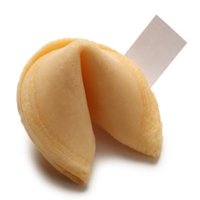
|
Some Common Myths Thought to be True - Myth 28
Myth 28: Fortune Cookies Originated in China
Like chop suey, fortune cookies are an American invention. They originated in
California, but who the actual inventor was, and which city in California is
the true home of the fortune cookie, has continued to be a matter of debate.
Unequivocally not Chinese, the fortune cookie may in fact not even be Chinese
American.
|
| Fortune Cookie | |
|
Another history claims that the fortune cookie was invented in San Francisco by
a Japanese immigrant named Makoto Hagiwara. Hagiwara was a gardener who
designed the famous Japanese Tea Garden in Golden Gate Park. An anti-Japanese
mayor fired him from his job around the turn of the century, but later a new
mayor reinstated him. Grateful to those who had stood by him during his period
of hardship, Hagiwara created a cookie in 1914 that included a thank you note
inside. He passed them out at the Japanese Tea Garden, and began serving them
there regularly. In 1915, they were displayed at the Panama-Pacific Exhibition,
San Francisco's world fair.
|
|
| ⇦ Back to Myth 27 Return to Myth Choices Page 2 On to Myth 29 ⇨ | |